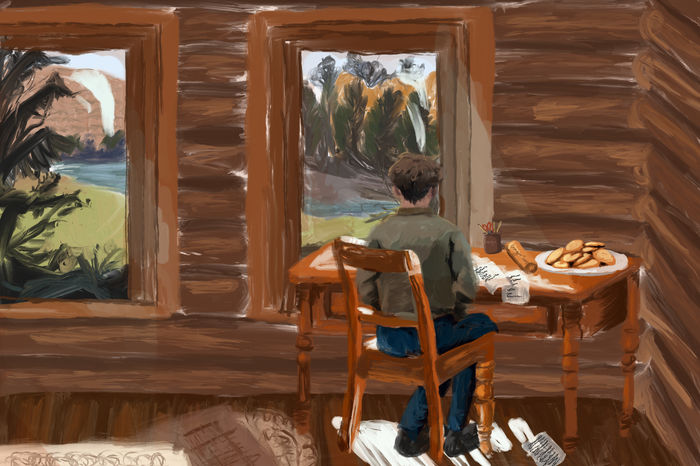The Agonies: sure, it’s rude to stare, but I can’t help my piercing eyes
Eve Connor writes back to Joe, wishing his toe well and manifesting a gaze as commanding as Kierkegaard’s

Dear Joe,
Sorry to hear about the stubbed toe. Was it the same one? My friend heard at a workshop that punching can (momentarily and allegedly) relieve anxiety because it forces your brain to put aside thoughts of expiry dates on fish and the gender pay gap and instead focus on squeezing your fist through space – for all its miracles, the human system cannot fathom the gender pay gap and deliver a mean left hook at the same time. So the theory goes. I have never tested it (when I’m anxious, it slips my mind) but I wonder if it could distract from pain as well? The next time your toe finds the doorframe, please do let me know.
“I need to read more of Søren Kierkegaard, the philosopher over whom I am my most maternal”
Or don’t. Forget and stub your toe and die a thousand fiery deaths because you have been to the States this summer and I have not. I’m making do (happily, to be truthful) with Flannery O’Connor’s Wise Blood, a novel about an ex-veteran who travels to a 1940s Deep South town and founds a new religion, ‘The Church without Christ.’ Wise Blood rocked my world last year and I promised to read it again when the weather was fitting, a.k.a. sticky & humid & impossible. I’m also writing about it for a dissertation for which I need to read more of Søren Kierkegaard, the philosopher over whom I am my most maternal. The “father of existentialism” called his daily walks “people baths” – very loveable! When one such bath brought him face-to-face with an editor whose newspaper had lampooned him over the course of several weeks, Kierkegaard fired a disapproving glance. The editor suppressed a laugh, then quit before the day was out.
While there is much to be said for serenity, I like this anecdote because of how bothered it sounds. Kierkegaard’s glance implies a high-mindedness that sometimes repels people from him: although he won’t stoop to an argument on the street, nor can he let the opportunity pass. He is sincere and this makes him comic, and also powerful. It is tempting to pretend coolness in these types of confrontations, to convince the person who has hurt us that their actions do not matter (see most Love Island re-couplings.) Kierkegaard is unapologetic for his feelings. He tells the editor that what he has done has affected him and that he believes he should be ashamed. That’s pretty major. I do not think his glance is any less intense because it is silent.
“Thank you for the senryu, also. I’m into Mr. Kipling fondant fancies at the moment”
O’Connor excels at portraying a selective emotional intensity that is at once absurd and true to life. Hazel Motes’ hawkish stare could skewer any Varsity editor. Even as he avoids the chatter of his neighbour in the train carriage (relatable), ‘the outline of his skull’ is ‘insistent’, taut with mute passion. In ‘Parker’s Back’, my favourite of O’Connor’s short stories, Parker possesses ‘an extra sense that told him when there was a woman nearby watching him’, similar to Enoch Emery’s titular ‘wise blood’ in the previous novel. Parker pretends to injure his hand to lure out his admirer; after he’s attacked with a broom for cursing, he grows ‘so incensed that he forgot that he hadn’t hurt his hand’. In the midst of the outburst, for an instant, his fabricated pain manifests, a petty example of the energies jumping around O’Connor’s cool prose worlds.
Later, Parker tattoos the face of the Byzantine Christ onto his back, caught by its “all-demanding eyes”. O’Connor articulates the ineffable headspace that induces an individual to buy a preacher’s hat, drive a tractor into a tree, or (in your case) choose the grey socks over the penguin ones despite every rationale otherwise.
All this to say, if you know a pal with the Byzantine Christ on their back, give them my number. Thank you for the senryu, also I’m into Mr. Kipling fondant fancies at the moment.
Intensely,
Eve
 News / Cambridge academics stand out in King’s 2026 Honours List2 January 2026
News / Cambridge academics stand out in King’s 2026 Honours List2 January 2026 Interviews / You don’t need to peak at Cambridge, says Robin Harding31 December 2025
Interviews / You don’t need to peak at Cambridge, says Robin Harding31 December 2025 Comment / What happened to men at Cambridge?31 December 2025
Comment / What happened to men at Cambridge?31 December 2025 News / Varsity’s biggest stories of 202531 December 2025
News / Varsity’s biggest stories of 202531 December 2025 Features / “It’s a momentary expression of rage”: reforming democracy from Cambridge4 January 2026
Features / “It’s a momentary expression of rage”: reforming democracy from Cambridge4 January 2026










